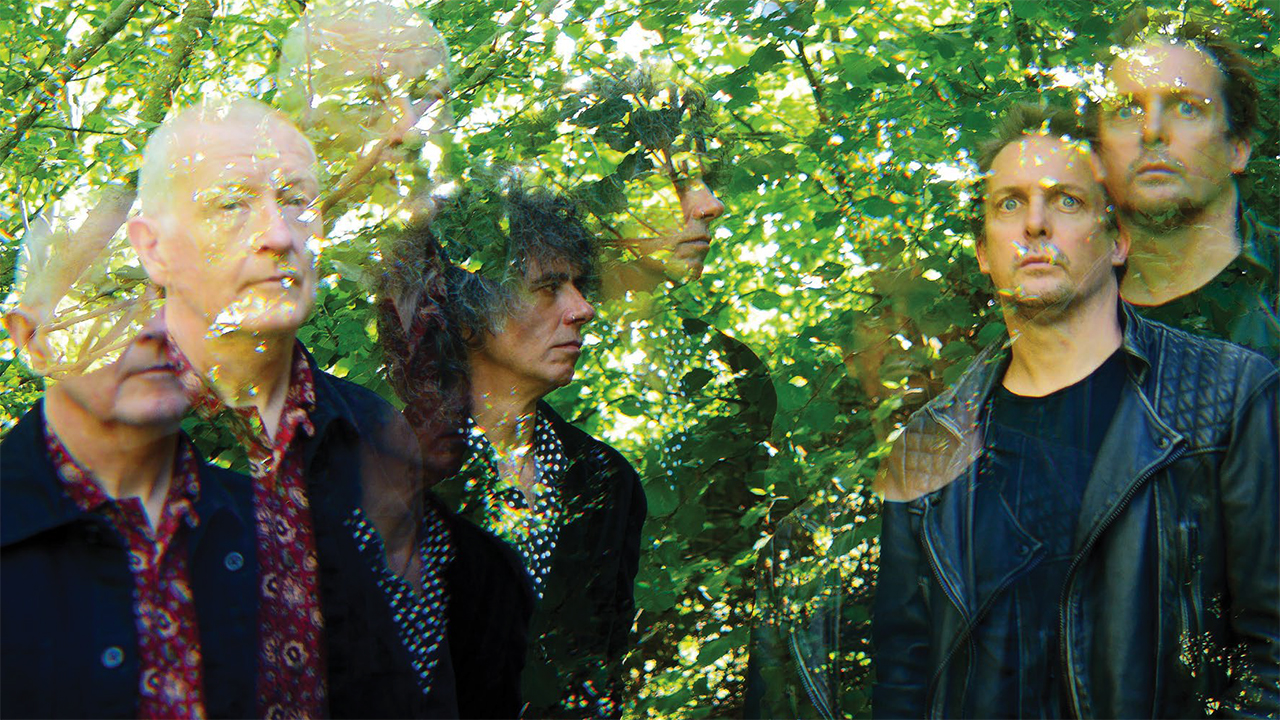The Enid: "The Story Of My Life Will Come Full Circle"
The man who is The Enid is too ill to carry on, but he’s ensuring the band will continue without him.

The clock is ticking for Robert John Godfrey. For the last four decades he’s been the leader, chief composer and sole constant member of symphonic prog pioneers The Enid. But Godfrey was diagnosed in 2012 with Alzheimer’s disease. And before it overtakes him, he’s determined to complete work on regenerating the band so that it can live on even though he won’t be part of it.
“I suppose I’d known I was ill for maybe a year,” says the mid-60s musician. “I began to notice changes with the way I perceived my surroundings, and with my day-to-day activities. I felt there was something wrong, and I suspected it might be dementia – or worse. But I didn’t do anything about it until last autumn; I was out driving and I temporarily forgot how to get home.”
He went for a test with a specialist nurse, and an MRI scan confirmed the changes associated with the early stages of Alzheimer’s. “I told them I wanted to be kept completely in the picture,” he says.
The Enid have achieved many firsts in their time. They set the standard for the way rock and classical music could work, with a string of symphonic instrumental albums in the 70s. More recently they pioneered crowd-funding long before Marillion went down that road to finance a new album, and were selling bespoke CD compilations years before iTunes or Spotify.
Before Godfrey bows to the inevitable, there’s another first to achieve: a seamless transition between the first generation of The Enid and the new version he’s been building for the past few years. His recent diagnosis has only hastened the process.
The Enid have always been a fluid collective. Countless members came and went even before the band recorded their 1976 debut album In The Region Of The Summer Stars, and there had been more than 20 line-ups before they split in 1999. When Godfrey reactivated the band in 2007, he brought in youthful guitarist Jason Ducker and bassist-percussionist Nicholas Willes alongside a pair of old hands: guitarist Max Read and drummer Dave Storey. But it was the addition of 24-year-old vocalist/keyboard player/clarinetist Joe Payne that is really turning heads. Not only do The Enid now have a proper frontman for the first time, they also have an amazing one.
IN THE REGION OF THE SUMMER STARS
The latest news, features and interviews direct to your inbox, from the global home of alternative music.
Godfrey and Payne make an odd couple, sitting side by side in a Glasgow musos’ pub before a show later tonight. Godfrey seems to revel in playing the role of a tweedy university don, with a pint of Scottish ale and a way of stating opinions that makes you wonder why you don’t always agree with him. Payne is a handsome young man, softly spoken but with a ready laugh and a thoughtful poise. He’s drinking black coffee because alcohol would risk damaging the voice with which he’s soon going to perform cartwheels.
The interaction between Godfrey and Payne – not to mention the rest of the band – has caused an explosion of new energy that’s shaking some old fans to their foundations; they thought they knew what ‘change’ meant in the context of The Enid, but they weren’t expecting this kind of transformation. It’s also inspiring a new generation of fans to join the new generation of the band. There’s even dancing at some concerts now. And there can’t be many who expected that.
“The Enid is now officially sexy,” Godfrey offered recently. “I remember when progressive bands generally were sexy, largely because we were all so young, slim and much more exhibitionist.”
Payne, a self-confessed Freddie Mercury fan, discovered The Enid through using their studio, run by Read. Until that point he’d been completely ensconced in pop music – “A bit X Factor,” he admits.
“They said: ‘We’re doing this gig. Why don’t you come along?’” he recalls. “I had no idea what to expect. I couldn’t believe what I was hearing – it was entrancing, emotional, and I’d never experienced anything like it.”
Through almost all their regenerations The Enid had been a mainly instrumental band. Payne saw no reason why he’d be the one to break the mould. Everything changed after he was asked to become part of their management team in 2011.
“I was still at university, and I needed a gap-year job,” he recalls. “Robert said: ‘Come and sort out our label.’ Then he suggested I go into the studio and sing Summer, just to see what my interpretation would be like. And that went on [2012 compilation] Arise And Shine Volume 3.”
While the band may have been bowled over by Payne’s talent, the fans were another matter altogether. He admits he faced a “mixed response” at first, but says it’s becoming more positive. At their Main Stage set at the HRH Prog festival in April, The Enid drew an interested audience entranced by Payne’s stunning falsetto vocal, and his beautiful clarinet part during The One And The Many, from Invicta. Then he polarised the audience by tearing off his formal dress shirt to reveal a T-shirt with the slogan ‘I’ve Been Naughty’ and said: “Right, let’s have some fucking fun!”
Within seconds the band transformed into something in the vein of Queen via the song Who Created Me (also from Invicta). By the time they were converting Enid classics into something that sounded closer to NIN than to ELP, most in the room had got the idea that, with Payne up front, The Enid can do almost anything.
“I spent the last year and a half tiptoeing around, going on stage dressed formally, performing my bit then running backstage to my keyboards. I felt that people didn’t want me there. Invicta has given me the confidence to present myself in a different way. That album wouldn’t be the same without my contribution. Why shouldn’t I be myself?”
Godfrey emphasises just how much of Invicta, their most recent album, came from Payne: “The vast majority of all melodic lines, and the harmonic outlines, were composed by Joe, not me. I’ve taken that material and done what I needed to do – to ‘Enify’ it, if you like. Max is responsible for developing the choral stuff. He works out what those harmonies should be, and if he gets stuck he comes to me.”
With Invicta, and the upcoming album which completes the Journey’s End trilogy that started in 2010, Godfrey is methodically letting the band become whatever it’s going to be once he’s gone. He has already more or less taken his hand off the tiller. “When we rehearse I hardly ever put in an appearance. I’ll come in at the last minute and make sure no one’s lost their way. That’s the way it needs to be. I can’t nanny them through this process – if they’re going to be a band in their own right, they need to do it.”
It seems to be a case of right place, right time. And, ultimately, time is of the essence for Godfrey.
“I’m still fine at the moment, quite coherent,” he says. “But a point will come when it won’t be a voluntary decision for me, it’ll be a compulsory one. I’m going to try and provide the means for this band to have a life without any involvement from me. If they want to carry on with it, they can; and if they don’t want to they don’t have to.”
In what will probably be a real first, the band’s founder is going to replace himself in the line-up.
“I probably have two or three years in which to find my successor and get him settled. He’ll need to have a good piano technique, with a background in classical/romantic music rather than jazz, a knowledge of music technology, a talent for finding a good tune, and a thorough understanding of harmony. Above all he will need to be generous in spirit and willing to collaborate with those who have different, but nevertheless just as valuable, abilities from his own.
“I’ve had a great life doing nothing but music – I have wonderful friends within the band and I feel very much loved and appreciated. I lost any fear of death many years ago. The story of my life will come full circle, as indeed it must. A symphony with a silence at either end.”
TIMELINE
1947 Robert John Godfrey born.
1973 The Enid formed.
1976 Debut album In The Region Of The Summer Stars released.
1991 Band splits.
1993 Godfrey re-forms band.
1999 Band splits.
2009 Godfrey re-forms band.
2010 Comeback album Journey’s End released.
2011 Frontman Joe Payne joins, and is set to be RJG’s successor.
Not only is one-time online news editor Martin an established rock journalist and drummer, but he’s also penned several books on music history, including SAHB Story: The Tale of the Sensational Alex Harvey Band, a band he once managed, and the best-selling Apollo Memories about the history of the legendary and infamous Glasgow Apollo. Martin has written for Classic Rock and Prog and at one time had written more articles for Louder than anyone else (we think he's second now). He’s appeared on TV and when not delving intro all things music, can be found travelling along the UK’s vast canal network.
